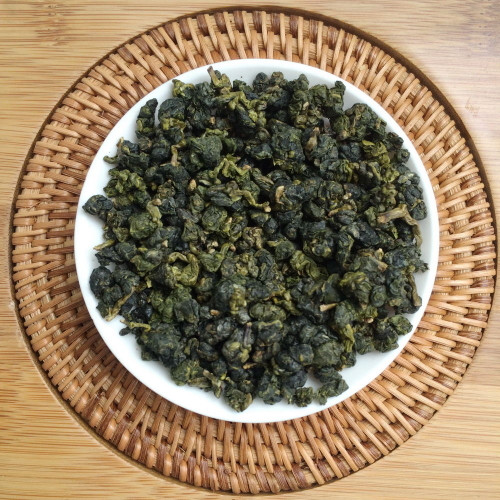Product Overview
Type: Oolong
Packaging: Bag
Origin: Taiwan, China
Description:
Taiwan has great oolong tea competitions. The competitions are organized by local tea associations and endorsed by local governments to guarantee their credibility. The participants are mostly oolong farmers. Tea competitions for growers started in 1975 as a way for producers to promote their crop. The first competition was organized by the Tea Growers Co-op in Lu Gu township - the home of the famous Dong Ding Oolong tea. The competition was open to all tea growers in Taiwan and offered a fabulous award for first prize - NT$4200 per jin (600 grams).
That first competition back in 1975 set the standard for future events. The rules and judging methods have remained almost the same over the years.There can be no identifying marks on the packaging - all tea must be judged "blind." The competition jin is divided into 3 lots of 200 grams each for each stage of the competition. Three grams of tea leaves are used to brew the tea in 150 cc ceramic pots and the tea is allowed to steep for 6 minutes. As many as 30 different teas can be judged at the same time. After it has steeped for for the required time the judges use 3 criteria to grade it - smell, appearance and taste. At each stage of the competition there may be 4 or 5 levels of winners.The top levels proceed to the next stage until a winner is finally selected by panel discussion amongst the judges.Each producer must submit his tea in 22 lots of 1 jin each. Of these 22 jins, 1 jin is for judging, 1 jin is for consumers to sample, and 20 jins are for auction.
The competitions select teas very strictly. Only teas of the best quality can enter the final competition, and the rest will be rejected. Teas from some competitions are very hard to get. Most competition teas are sold out before or soon after the awards are publicized. And for most competitions, it's extremely hard to get the top award teas. All teas are submitted by farmers or tea merchants who are directly related to tea farmers.The honor goes to the farmers and local factories, the real producers. Each award title is restricted to the specific 27 lb. tea submitted to the competition. The same farmer may submit multiple entries to a competition and may win multiple awards of various levels. But a farmer may produce hundreds of pounds of tea each year, and winning awards doesn't mean all this farmer's tea is award-winning tea. When you buy a competition tea, what you get is just the tea accepted and strictly inspected by the competition committee.Taiwan Oolong Competitions' solid credibility is established on this strict rule.
Li Shan is part of the Jade mountain range. This is where the highest mountains of Taiwan are found. Lishan is the most renowned name in Taiwan for producing the finest High Mountain Oolong. Because of the high altitude, the tea plants grow up slow, leaf is bigger, quantity is smaller, quality is best. Lishan Tea has a substantial depth of flavor and viscosity to its texture that is produced only from higher elevation tea farms. Li Shan is the highest tea-growing region in Taiwan. Oolong tea plantations lie between 1800 meters and 2650 meters. These altitudes provide ideal conditions for oolong tea. Li Shan has a low temperature year-round with abundant moisture. The higher altitudes see winter snow and even during the spring oolong tea harvest there is a chill in the air. At an altitude of 2600 meters there are only two oolong tea harvests per year. The lower altitudes on Li Shan can produce 2 harvests of oolong tea per year, spring and winter. Compared with the spring crop, the winter one has a longer growth time. Besides, the low temperature and misty weather make it tastes mellow and pure. This year's winter tea is a particularly robust and sweet batch.
The texture is creamy, and it has a beautiful, clean flavour. The flavour has notes of lilac, cream, honey, mineral notes, and a mild underlying melon flavour. The texture is perfectly smooth, the finish mostly clean with a mild, lingering grassy vegetal taste. The tea is equally aromatic and flavourful, a rare find for any tea. The type of flavor is similar to the citrus fruit. It gives a very refreshing flavor accompanied by a sweet flowery flavor. This tea does not give any bitterness and astringency, but a very smooth mouth feel and is sweet. The base tea offers a sweet, nutty, toasty flavor and it melds really nicely with the fruity notes of the berry flavors.
Brewing Guide: We highly recommend brewing Li Shan Oolong gongfu style to appreciate its many layers of flavor. The oolong may be prepared in a regular teapot, an Yixing clay pot, or in individual cups. Use about 1 tsp. per cup (8 oz.) of water heated to 80-90°C (176-194°F). Infuse for 2-3 minutes and pour off. The leaves may be resteeped 7-8 times.












